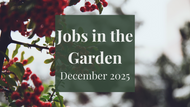Jobs in the Garden: December 2025
25th Nov 2025
Essential December Garden Jobs in the UK: Winter Care for Your Garden
As the festive season approaches and the temperatures continue to drop, December in the UK signals the heart of winter. The garden may seem quiet, but there are still essential tasks to keep your outdoor space in good shape and prepare for the coming spring. Here’s a guide to the essential jobs you should be doing in the garden during December.
1. Protect Plants from Frost
December brings freezing temperatures and the risk of frost, which can damage tender plants. Keep an eye on the weather forecast and cover any vulnerable plants with horticultural fleece, cloches, or bubble wrap. You can also add a thick layer of mulch around the base of plants to help insulate their roots. For pots, move them to a sheltered spot or bring them inside to prevent frost damage.
2. Check for Snow and Ice Damage
Heavy snow or icy conditions can cause harm to garden structures, trees, and plants. Regularly check for snow build-up on shrubs, trees, and fences, as the weight of snow can break branches or topple structures. Gently brush snow off branches to avoid damage. Be mindful of icy paths or garden steps too, and treat them with grit or salt to avoid slips and falls.
3. Clear Dead or Damaged Plant Growth
Take a walk around your garden and remove any dead or damaged plant material. Cut back any fallen or diseased leaves, stems, or branches from trees, shrubs, and perennials. This helps to tidy up your garden and also prevents the spread of disease over the winter months. Be sure to compost the healthy plant matter, but dispose of any diseased material safely.
4. Feed Birds and Wildlife
Winter can be tough for garden wildlife, so December is the perfect time to help. Set up bird feeders filled with a variety of foods, such as seeds, fat balls, and suet. If you have space, leave piles of leaves, logs, or branches to provide shelter for hedgehogs, insects, and small mammals. Don’t forget to supply fresh water for birds, as frozen ponds or birdbaths can be challenging for wildlife.
5. Look After Your Lawn
Although your lawn is likely dormant during December, it still requires a little care. If you haven't already, make sure your lawn is aerated to improve drainage, and avoid walking on it when it’s frosty or frozen, as this can cause damage to the grass. Also, if you have moss on your lawn, it’s a good time to apply moss killer and rake it out once the weather improves.
6. Maintain Garden Tools and Equipment
With gardening tasks slowing down, take the opportunity to clean and maintain your tools and equipment. Clean off any dirt, oil moving parts, and sharpen your garden tools to ensure they are in good working order for when the growing season returns. Don’t forget to store any equipment like lawnmowers, pressure washers, or garden furniture in a dry place to prevent rust and deterioration.
7. Check Greenhouses and Cold Frames
If you have a greenhouse or cold frame, now is the time to check that it is secure and well-prepared for the colder months. Make sure the glass is intact and that there are no draughts. Clean and disinfect the interior to prevent pests or diseases from overwintering. You may also want to set up a heater to protect any plants you’ve left inside or to grow hardy winter crops.
8. Avoid Overwatering
With the colder weather, plants will be growing much slower, and they won’t need as much water. Overwatering in winter can cause root rot and fungal diseases. Be sure to check the moisture levels in your pots and garden beds before watering. If the soil is still damp, hold off on watering until it dries out a little.
9. Plan for Next Year
December is the ideal month to start thinking ahead for next year’s garden. Take the time to plan what you’d like to grow, how to rearrange your space, and which plants you’d like to add to your garden in spring. It’s a good time to order seeds, bulbs, or plants for the coming months. You could even start drawing up a planting schedule to ensure you’re ready for the busy gardening months ahead.
10. Protect Your Pond
If you have a garden pond, it’s important to keep it in good condition over the winter. Remove any fallen leaves or debris from the surface, as this can cause the water to become polluted. If the pond is small, consider covering it with netting or a pond cover to prevent ice from forming and to keep wildlife safe. For larger ponds, use a pond heater to keep the surface from freezing completely, which will help fish and other pond life to survive.
Conclusion
While your garden may seem to be in a dormant state during December, there are still several key tasks to help keep it in good shape over the winter. From protecting your plants from frost and ensuring wildlife is well-fed, to maintaining your tools and planning ahead for next season, these jobs will ensure your garden stays healthy and ready for the spring. By putting in a little effort now, you’ll enjoy a vibrant garden when the warmer months return.






